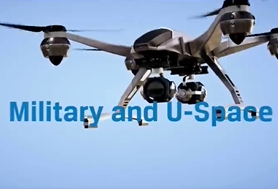The European Defence Agency (EDA) awarded Egis a follow-on contract in mid-July to further study the impacts of the implementation & deployment of U-space in Europe on military activities at low-level, for example low-level military training flights. This is the third contract under a framework agreement signed with Egis in 2021.
The latest study will include a focus on the “e-conspicuity” aspects – a range of technologies that can help airspace users to be more aware of other aircraft in the same airspace – and on “dynamic airspace reconfiguration”, two topics that are part of the new U-Space regulation but are not yet fully defined from a military perspective, says EDA.
Among key objectives of the study, entitled Military and U-space: Guidelines, as military as necessary, as civil as possible, will investigate the impacts of U-space on military missions and operations; how the military can mitigate these risks; and associated costs.
The purpose is to establish smooth and effective coexistence of civil and military operators in the future U-space drone ecosystem.
Through a four-year framework contract, Egis is assisting the European Defence Agency (EDA) with the establishment and promotion of a common military view on the impact of the development of U-space in Europe and to promote this view to all civilian stakeholders involved in U-space development. The study started with a first phase in 2021 involving:
- Analysis of the U-space services currently under implementation, or planned for implementation, and assessing whether they could be beneficial to the military or negatively impact their missions.
- Developing military U-space use cases covering a wide scope of military missions and either beneficial to the military or mandatory when/if the military operate in a U-space environment.
- Calculating any financial costs for the military resulting from U-space implementation.
- Formulating guidelines and recommendations to the military regarding U-space services and investigating how military use cases can be promoted to civilian stakeholders.
For more information visit:
eds.europa.eu/u-space-study




